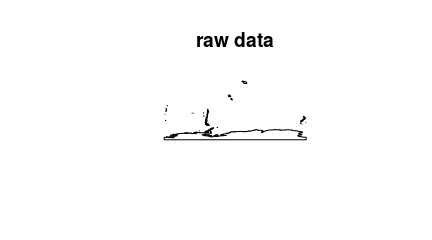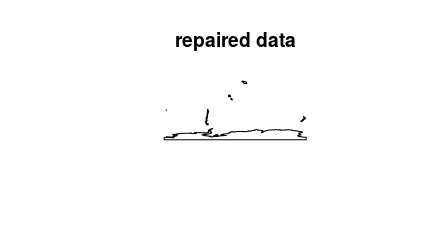prepairr: Interface to the automatic geometry repair tool 'prepair'
Overview
The prepairr R package provides an interface to the prepair tool for repairing invalid polygon geometries (Ledoux, Arroyo Ohori & Meijers, 2014). This project was developed as an experiment to benchmark the performance of the prepair tool for repairing invalid geometries in large spatial datasets. Unfortunately, this package is actually slower than standard geometry cleaning tools (such as the lwgeom R package). As a consequence, this package is unlikely to receive further development.
Installation
The developmental version of the prepairr R package can be installed using the following R code. Please note that this package will only work on Unix systems and requires the sf R package which requires additional software to be installed. If you encounter problems installing the prepairr R package, please consult the installation instructions for the sf R package.
if (!require(remotes))
remotes::install_github("jeffreyhanson/prepairr")Usage
Here we will explore the usage and (substandard) performance of this package. To achieve this, we will first load the prepair package and some other packages for working with spatial vector data.
# load packages
library(prepairr)
library(lwgeom)
library(rworldxtra)Next, we will obtain a small spatial dataset containing invalid geometries. Specifically, we will import data delineating country boundaries (originally from Natural Earth).
# import data, subset data to reduce total run time, and convert to sf format
data(countriesHigh, package = "rworldxtra")
x <- as(countriesHigh[c(12, 41, 132, 174, 190, 197, 211, 225), "ADMIN"], "sf")
# preview data
print(x)## Simple feature collection with 8 features and 1 field
## geometry type: MULTIPOLYGON
## dimension: XY
## bbox: xmin: -179.999 ymin: -89.99983 xmax: 180 ymax: 49.60178
## epsg (SRID): 4326
## proj4string: +proj=longlat +datum=WGS84 +no_defs
## ADMIN geometry
## 12 Antarctica MULTIPOLYGON (((-61.03006 -...
## 41 Chile MULTIPOLYGON (((-69.47578 -...
## 132 Liberia MULTIPOLYGON (((-9.433115 7...
## 174 New Zealand MULTIPOLYGON (((174.0249 -4...
## 190 Romania MULTIPOLYGON (((23.32512 43...
## 197 Senegal MULTIPOLYGON (((-13.08374 1...
## 211 Slovakia MULTIPOLYGON (((19.62695 49...
## 225 Tonga MULTIPOLYGON (((-175.3144 -...
# plot data
plot(st_geometry(x), main = "raw data")# verify that the dataset has invalid geometries
all(suppressWarnings(st_is_valid(x)))## [1] FALSE
Now we will repair the data using the prepair tool. We will also record how long it takes to repair the data so we can compare it with standard data cleaning tools later. Please note that the timings reported below may be different on your system, since I have added CXX11FLAGS += -O3 -march=native to the Makevars file on my computer to increase performance of compiled code in R packages.
# repair geometries using st_prepair and record processing time
prepair_time <- system.time({
y <- st_prepair(x)
})[[3]]
# preview cleaned data
print(y)## Simple feature collection with 8 features and 1 field
## geometry type: GEOMETRY
## dimension: XY
## bbox: xmin: -179.999 ymin: -89.99983 xmax: 180 ymax: 49.60178
## epsg (SRID): 4326
## proj4string: +proj=longlat +datum=WGS84 +no_defs
## ADMIN geometry
## 12 Antarctica MULTIPOLYGON (((-52.51818 -...
## 41 Chile MULTIPOLYGON (((-68.63828 -...
## 132 Liberia POLYGON ((-9.433114 7.99331...
## 174 New Zealand MULTIPOLYGON (((174.0249 -4...
## 190 Romania POLYGON ((23.19696 43.86275...
## 197 Senegal POLYGON ((-13.09161 15.5023...
## 211 Slovakia POLYGON ((19.62873 49.41132...
## 225 Tonga MULTIPOLYGON (((-175.3638 -...
# verify that all geometries are now valid,
# except they aren't so this tool is slow AND doesn't fix all geometry issues
all(st_is_valid(y))## [1] FALSE
# print processing time with st_prepair (seconds)
print(prepair_time)## [1] 3.552
# since st_prepair performs some preliminary processing to prepare data
# for the prepair tool, we can also print the time spent just cleaning the
# polygons using the prepair tool to measure its performance alone (seconds)
print(attr(y, "prepair_time"))## [1] 3.275
# plot repaired data
plot(st_geometry(y), main = "repaired data")Next we will repair the data using the lwgeom R package and record how long this tool takes to repair the data.
# repair geometries using lwgeom and record processing time
lwgeom_time <- system.time({
z <- st_make_valid(x)
})[[3]]
# preview cleaned data
print(z)## Simple feature collection with 8 features and 1 field
## geometry type: MULTIPOLYGON
## dimension: XY
## bbox: xmin: -179.999 ymin: -89.99983 xmax: 180 ymax: 49.60178
## epsg (SRID): 4326
## proj4string: +proj=longlat +datum=WGS84 +no_defs
## ADMIN geometry
## 12 Antarctica MULTIPOLYGON (((167.1133 -7...
## 41 Chile MULTIPOLYGON (((-67.49094 -...
## 132 Liberia MULTIPOLYGON (((-9.433115 7...
## 174 New Zealand MULTIPOLYGON (((169.1804 -5...
## 190 Romania MULTIPOLYGON (((23.32512 43...
## 197 Senegal MULTIPOLYGON (((-13.08374 1...
## 211 Slovakia MULTIPOLYGON (((19.62695 49...
## 225 Tonga MULTIPOLYGON (((-176.207 -2...
# verify that all geometries are now valid
all(st_is_valid(z))## [1] TRUE
# print processing time (seconds)
print(lwgeom_time)## [1] 1.454
As we can see, the st_prepair function in this package took 2.1 seconds longer to complete. Therefore do not use this package to clean your data.
References
Citation
This is an experimental package. You should not cite this package because you should not be using it.



